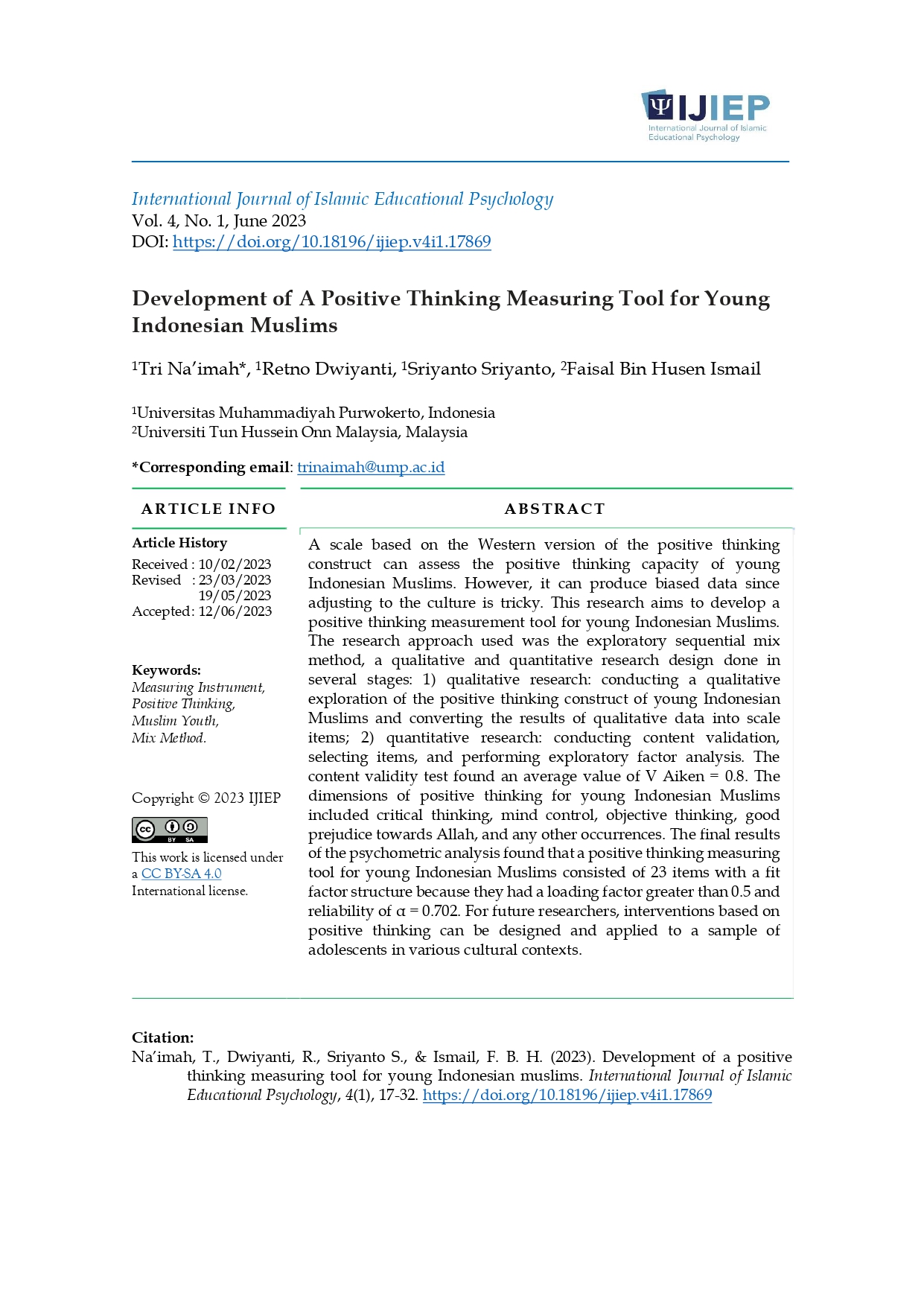Development of A Positive Thinking Measuring Tool for Young Indonesian Muslims
DOI:
https://doi.org/10.18196/ijiep.v4i1.17869Keywords:
Measuring Instrument, Positive Thinking, Muslim Youth, Mix MethodAbstract
A scale based on the Western version of the positive thinking construct can assess the positive thinking capacity of young Indonesian Muslims. However, it can produce biased data since adjusting to the culture is tricky. This research aims to develop a positive thinking measurement tool for young Indonesian Muslims. The research approach used was the exploratory sequential mix method, a qualitative and quantitative research design done in several stages: 1) qualitative research: conducting a qualitative exploration of the positive thinking construct of young Indonesian Muslims and converting the results of qualitative data into scale items; 2) quantitative research: conducting content validation, selecting items, and performing exploratory factor analysis. The content validity test found an average value of V Aiken = 0.8. The dimensions of positive thinking for young Indonesian Muslims included critical thinking, mind control, objective thinking, good prejudice towards Allah, and any other occurrences. The final results of the psychometric analysis found that a positive thinking measuring tool for young Indonesian Muslims consisted of 23 items with a fit factor structure because they had a loading factor greater than 0.5 and reliability of α = 0.702. For future researchers, interventions based on positive thinking can be designed and applied to a sample of adolescents in various cultural contexts.References
Aiken, L. R. (1985). Three Coefficients For Analyzing The Reliability And Validity Of Ratings. Educational and Psychological Measurement, 45, 131–141. https://journals.sagepub.com/doi/abs/10.1177/0013164485451012
Akhtar, H., & Azwar, S. (2019). Indonesian adaptation and psychometric properties evaluation of the big five personality inventory: IPIP-BFM-50. Jurnal Psikologi, 46(1), 32-44. https://doi.org/10.22146/jpsi.33571
Albrecht, K. (2009). Brain power: Learn to improve your thinking skills. Simon and Schuster.
Azwar, S. (2014). Reliabilitas dan Validitas (Edisi 4). Yogyakarta: Pustaka Pelajar.
Bekhet, A. K., & Garnier-Villarreal, M. (2017). The Positive Thinking Skills Scale: A screening measure for early identification of depressive thoughts. Applied Nursing Research, 38, 5-8. https://doi.org/10.1016/j.apnr.2017.08.004
Bekhet, A. K., & Zauszniewski, J. A. (2013). Measuring use of positive thinking skills: Psychometric testing of a new scale. Western journal of nursing research, 35(8), 1074-1093. https://doi.org/10.1177/0193945913482191
Bundura, A. (1989). Social cognitive theory. InR. Vasta (Ed), Annal of Child Development, 6, 1-60.
Chien, C. H., & Huang, Y. W. (2022). Psychometric properties of the Chinese version of the Positive Thinking Scale in individuals after hip fracture surgery. Psicologia: Reflexao e Critica, 35. https://doi.org/10.1186/s41155-022-00235-x
Creswell, J. W. (2014). Research design: qualitative, quantitative, and mixed methods approaches. 4th ed. Thousand Oaks, California, SAGE Publications.
Dabi, S. A. D., Tentama, F., & Situmorang, N. Z. (2019). Pengujian validitas dan reliabilitas konstruk berfikir positif. Prosiding Seminar Nasional Magister Psikologi Universitas Ahmad Dahlan, 58–64. http://seminar.uad.ac.id/index.php/snmpuad/article/view/2996
Dharmastuti, A., Wiyono, B. B., Hitipeuw, I., & Rahmawati, H. (2020). Adolescent critical thinking prior to social media information sharing. International Journal of Innovation, Creativity and Change, 13(10), 1195-1213. https://www.ijicc.net/images/vol_13/Iss_10/1310110_Dharmastuti_2020_E_R.pdf
Ghozali, I. (2018). Aplikasi analisis multivariate dengan program IBM SPSS. Semarang: Badan Penerbit Universitas Diponegoro, 490.
Gusniarti, U., Wibisono, S., & Nurtjahjo, F. E. (2017). Validasi islamic positive thinking scale (IPTS) berbasis kriteria eksternal. Jurnal Psikologi Islam, 4(1), 53-69. http://www.jpi.api-himpsi.org/index.php/jpi/article/view/38
Harmaini, H., Jannah, P. M., Salmiyati, S.,& Tahir, K. R.(2022). Trust and Character Development (Life Lessons from Prophet Ibrahim As). International Journal of Islamic Educational Psychology, 3(1), 58-73. http://dx.doi.org/10.18196/ijiep.v3i1.13810
Hair, J.F., Black, W.C., Babin, B.J. and Anderson, R.E. (2010) Multivariate Data Analysis. 7th Edition, Pearson, New York.
Heard, J., Scoular, C., Duckworth, D., Ramalingam, D., & Teo, I. (2020). Critical Thinking: Skill Development Framework. Australian Council for Educational Research. https://research.acer.edu.au/ar_misc/41
Hidayat, N., & Na’imah, T. (2016). Kebutuhan Akan Rasa Aman Dan Happiness Pada Peserta Didik. University Research Coloquium, 83–89. http://hdl.handle.net/11617/7715
Peale, N. V. (2006). The Power of Positive Thinking. The Quality Book Club. https://doi.org/10.7748/cnp.7.10.18.s21
Rahmah, H. (2021). Konsep berpikir positif (husnuzhon) dalam meningkatkan kemampuan self healing. Al Qalam: Jurnal Ilmiah Keagamaan Dan Kemasyarakatan, 15(2), 118–126. https://doi.org/10.35931/aq.v15i2.732
Rusydi, A. (2012). Husn al-zhann: the Concept of positive thinking in Islamic psychology perspective and its benefit on mental health. Proyeksi: Jurnal Psikologi, 7(1), 1-31. http://dx.doi.org/10.30659/jp.7.1.1-31
Santrock, J. (2011). Educational Psychology (Vol. 21, Issue 1). The McGraw-Hill.
Sylvia, R., & Tasaufi, M. N. F. (2022). Konsen husnuzan bagi kesehatan mental di mada pandemi covid-19. Jurnal Psikologi Terapan Dan Pendidikan, 4(1), 39–46. https://media.neliti.com/media/publications/482283-none-11b22958.pdf
Tsutsui, K., & Fujiwara, M. (2015). The Relationship between Positive Thinking and Individual Characteristics : Development of the Soccer Positive Thinking Scale. Football Science, 12, 74–83. https://researchmap.jp/Komachi-1/published_papers/1536144/attachment_file.pdf
Wahidah, F. R., Setyadi, E. J., & Grafiyana, G. A. (2021). Efektivitas pelatihan growth mindset pada siswa SMA. Psycho Idea, 19(1), 103–114. https://doi.org/10.30595/psychoidea.v19i1.9147
Weston, E. K. (2005). Positive Thinking : Toward a Conceptual Model and Organizational Implications. https://digitalcommons.pace.edu/honorscollege_theses/15/
Yucel, S. (2014). The notion of “Husnu’l Zann” or positive thinking in Islam: Medieval perspective. International Journal of Humanities and Social Science, 4(6), 101-112. http://www.ijhssnet.com/journals/Vol_4_No_6_April_2014/10.pdf
Zhou, Y. (2019). A mixed methods model of scale development and validation analysis. Measurement : Interdisciplinary Research and Perspectives, 17(1), 38–47. https://doi.org/10.1080/15366367.2018.1479088

Downloads
Published
How to Cite
Issue
Section
License

- Share — copy and redistribute the material in any medium or format
- Adapt—remix, transform, and build upon the material for any purpose, even commercially.
The licensor cannot revoke these freedoms as long as you follow the license terms. Under the following terms:
- Attribution: You must give appropriate credit, provide a link to the license, and indicate if changes were made. You may do so in any reasonable manner, but not in any way that suggests the licensor endorses you or your use.
- ShareAlike: If you remix, transform, or build upon the material, you must distribute your contributions under the same license as the original.
- No additional restrictions — You may not apply legal terms or technological measures that legally restrict others from doing anything the license permits.






